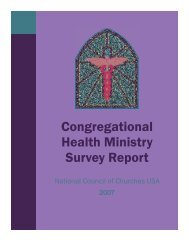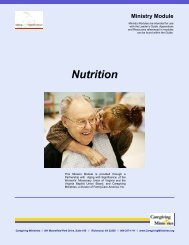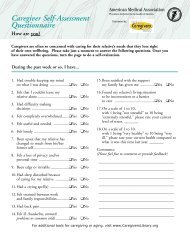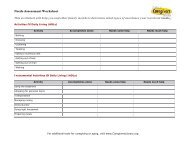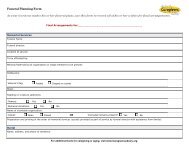MILES AWAY: - National Alliance for Caregiving
MILES AWAY: - National Alliance for Caregiving
MILES AWAY: - National Alliance for Caregiving
Create successful ePaper yourself
Turn your PDF publications into a flip-book with our unique Google optimized e-Paper software.
• What effect does distance have on the caregiver’s<br />
work and workplace accommodations?<br />
• How does distance affect out-of-pocket<br />
expenses?<br />
• Has caregiving affected the caregiver’s health?<br />
Study Methodology<br />
Zogby International, a polling and market research<br />
firm, issued email invitations to 79,851 individuals<br />
who had agreed to participate in on-line surveys.<br />
This pool was configured to be representative of<br />
the larger US population with a margin of error<br />
of +/- 2.8%. There were 8,438 responses to<br />
the invitation to participate in a survey on family<br />
life, with 1,130 (13%) of the respondents meeting<br />
the criteria of helping someone 55+ during the<br />
past year, who has “chronic physical, cognitive or<br />
mental health problems” and who lives an hour or<br />
more away.<br />
As Table 1 shows, the long-distance caregiver<br />
sub-sample was more likely to be married and to<br />
report a higher income as a group than the larger<br />
group from whom they were sampled. The relatively<br />
large number of male long-distance caregivers<br />
is most likely an artifact of the respondent<br />
pool, two-thirds of whom are men.<br />
The Zogby International on-line survey panel was<br />
determined to be representative of the US population<br />
within +/- 2.8% margin of error; sub-samples<br />
of this panel have higher margins of error. An online<br />
methodology is not necessarily generalizable<br />
to the universe of long-distance caregivers in the<br />
US.<br />
Table 1. Comparison of Long-Distance Caregivers<br />
With <strong>National</strong> Respondent Pool<br />
Gender<br />
Male<br />
Long-Distance Caregivers<br />
Respondent Pool<br />
0% 10% 20% 30% 40% 50% 60% 70% 80%<br />
58%<br />
65%<br />
The distance makes it very difficult to keep up<br />
to date on how my aunt is doing. It makes it<br />
very difficult to see her physically in order to<br />
make an evaluation of her medical and mental<br />
stability.<br />
Female<br />
Marital Status<br />
Married<br />
Single<br />
11%<br />
18%<br />
42%<br />
35%<br />
72%<br />
65%<br />
The most difficult part of caring <strong>for</strong> someone<br />
at a distance is taking time away from my own<br />
home and things that need to be done. I’m<br />
exhausted after returning home from giving<br />
assistance.<br />
Divorced,<br />
Widowed<br />
Separated<br />
11%<br />
13%<br />
Together as<br />
a Couple<br />
5%<br />
4%<br />
Average<br />
Annual<br />
Income<br />
$42,750<br />
$41,750<br />
4



